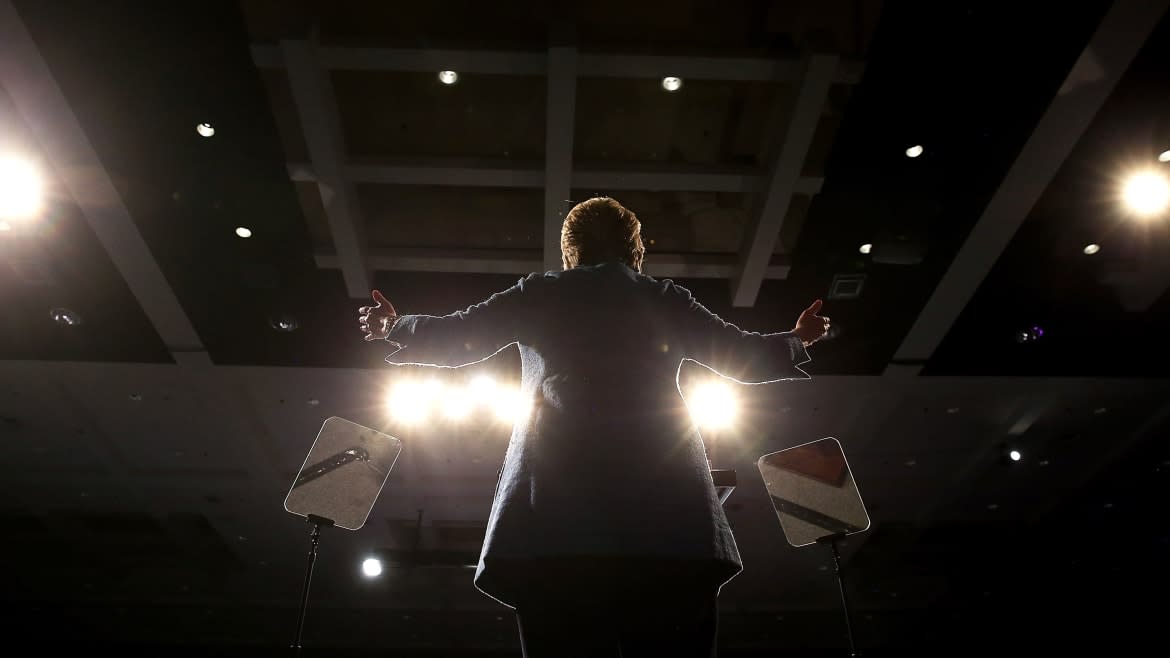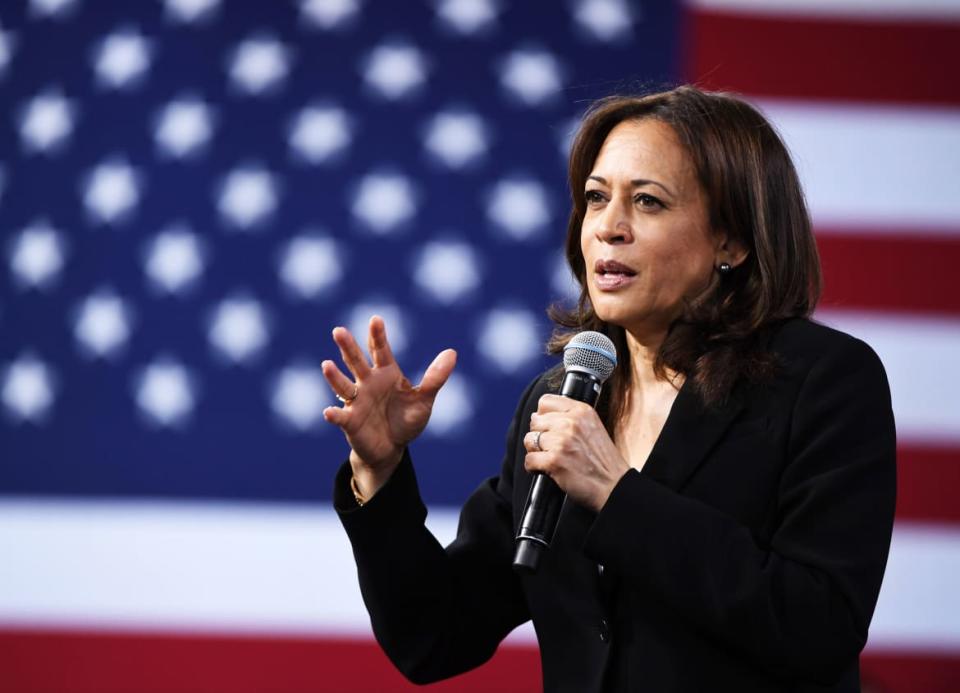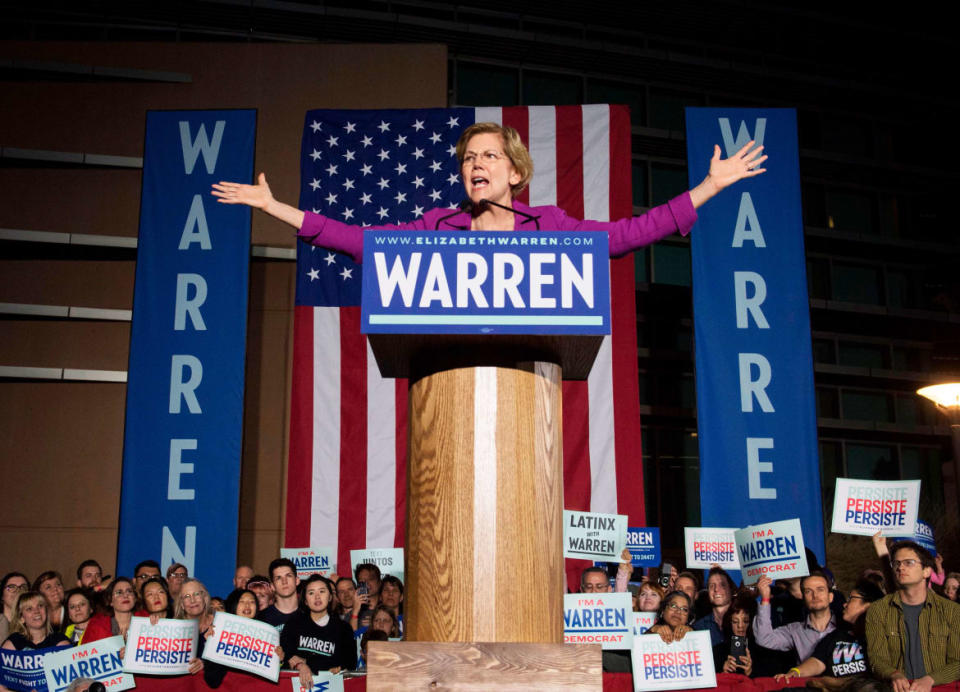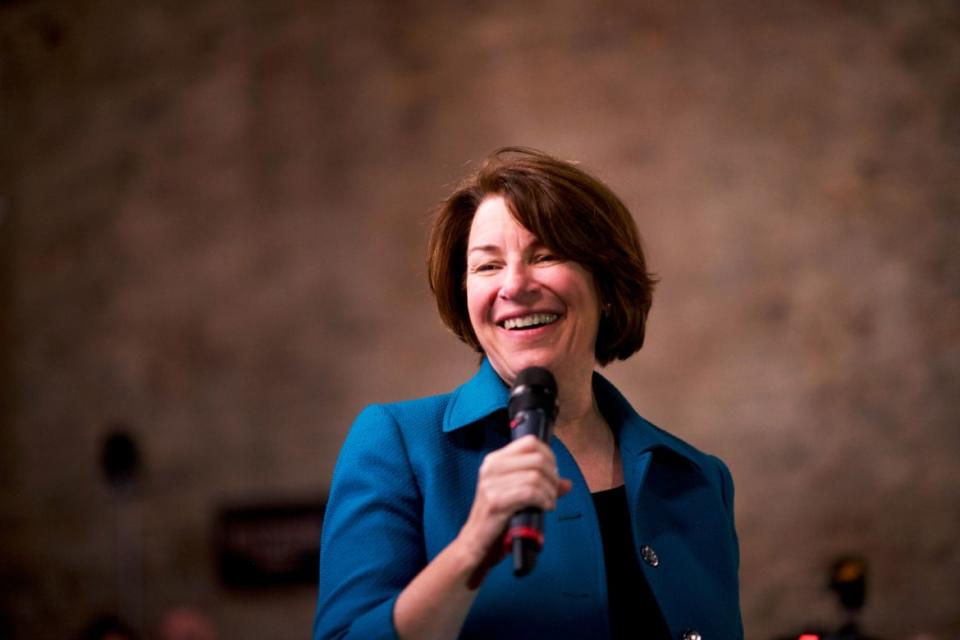How Long Will It Take Before We Can Say ‘Madam President’?

- Oops!Something went wrong.Please try again later.
- Oops!Something went wrong.Please try again later.
- Oops!Something went wrong.Please try again later.
- Oops!Something went wrong.Please try again later.
- Oops!Something went wrong.Please try again later.
“I would vote for a woman, but the women running for president just aren’t that likable.”
In 2020, six women ran for president, the same number as nearly all previous campaigns previously. Four were eminently qualified, well-spoken, intelligent, and hard-working. They lost.
Electable: Why America Hasn’t Put a Woman in the White House…Yet by Ali Vitali is part election post-mortem, part professional reflection about the media’s role covering female candidates, part personal memoir, and part prescription for the future.
In 2019, Vitali crisscrossed the country in planes, trains, and automobiles covering Amy Klobuchar, Kristen Gillibrand, Kamala Harris, and Elizabeth Warren. She watched them surge and then flame out before Joe Biden consolidated his support and crushed his opponents before Super Tuesday.

Democratic presidential candidate (and future US Vice President) US Senator Kamala Harris (D-CA) speaks at the National Forum on Wages and Working People: Creating an Economy That Works for All at Enclave, Las Vegas, Nevada, April 27, 2019.
To be sure, factors other than gender produced Biden’s victory. His position as Barack Obama’s vice president and name recognition provided by eight years in the White House gave him an immediate leg up. Voters also believed he was trustworthy and kind. The presence of Donald Trump on the other side of the ticket dominated the conversation in the primary. Democratic voters weren’t just selecting the most qualified candidate or candidate they liked the most, but the one they thought would be most likely to defeat Trump and the mortal threat he posed to the nation.
GOP Surges Amid Exodus of Women Democrats From Congress
Faced with this menace, most Democrats concluded that even if they supported a female candidate, their neighbors might not. Biden was the safest choice.
Why? Vitali posits a few reasons why Democratic voters overwhelmingly concluded a woman couldn’t win in 2020 and then she backs it up with hard-won data. First, the standards voters use to evaluate candidates are not applied evenly to men and women. Which sounds a bit like a “duh” statement, but the real-life examples Vitali provides smack the reader in the face.
On Feb. 7, 2020, Klobuchar pointed out that her credentials far outweighed those of her rival, Pete Buttigieg. She was right. Buttigieg had only served as mayor of South Bend, Indiana, and had lost his only state-wide campaign. Instead, he leaned on his service in the private sector and the military to boost his credentials.
Vitali argues that Buttigieg is both exceptionally talented and brilliant, and benefited from male privilege in the 2020 primary election. No female mayor would have been afforded the same platform. Voters will support male candidates with few qualifications because of their future potential, but women must show their extensive track-record of success.
The inverse is also true. Voters will support a male candidate they don’t like because they think he is qualified or will be successful in office—an argument offered by many Republican voters about Trump. Yet, when it comes to women candidates, they will say “there’s just something about her I don’t like.”
This principle applied in 2020. No one really quibbled with Klobuchar, Harris, Gillibrand, or Warren’s credentials. They just said there was something about them that didn’t quite sit right.

Democratic White House hopeful Massachusetts Senator Elizabeth Warren speaks to her supporters during a campaign rally on the eve of the California Democratic Primary in Monterey Park, east of Los Angeles, California on March 2, 2020
The tricky roles of ambition and emotion also played a sizable role behind the women candidates’ disappointing finish in 2020. In the Early Republic, politicians weren’t supposed to campaign. They couldn’t appear too interested in power, but rather had to adopt a reluctant willingness to serve if tapped by their fellow citizens. Those expectations no longer apply to men, but they still apply to women.
This challenge often emerges when candidates regularly tell their political origin stories on the campaign trail. The women anchor their stores in experiencing or witnessing hardship and seeking opportunities to help others avoid those same circumstances. Klobuchar was forced out of the hospital too quickly after childbirth. Warren was fired from her teaching job for her pregnancy. Others, including Republicans like Kristi Noem, talk about how others encouraged them to run for office.
Men talk about why they will be good at the job.
The female candidates might genuinely be motivated to rectify these wrongs (and I think they are), but they also know they can’t appear too ambitious. Vitali writes, “Politics tends to swat back, instead of reward, women who openly politick and make power plays.”
For example, at the first Democratic Primary debate, Kamala Harris had her biggest moment when she attacked Joe Biden’s record on busing. While it was initially a boon to fundraising, quickly observers began to question whether it was too critical. Was she too calculating? Was she too ambitious?
These same concerns followed Harris after Biden had secured the nomination and his team vetted Harris for the vice presidency. Many of Biden’s close allies worried Harris was too ambitious and would always have one eye toward her own presidential campaign. They preferred Karen Bass, a representative in Congress from California.
As Vitali demonstrates, these concerns were patently absurd. Bass is just as ambitious as Harris—no one becomes the speaker of the largest state legislature or runs for Congress if they don’t have ambition. Second, Harris’s best chance of following Biden in the Oval Office is helping him succeed as president. No VP has ever succeeded by stabbing their boss in the back. Finally, no one voiced those concerns about Biden’s ambition when he was Obama’s VP, despite Biden’s repeated campaigns for president dating back to 1988.
When not dodging accusations of inappropriate ambition, female candidates must find the right balance between coldness and emotional. For women, tears are dangerous because they imply weakness, and anger implies a lack of control. For men, anger is powerful. Biden’s best moments as a candidate (and as president) are when he harnesses righteous anger.
Women are keenly aware of this challenge. Any mistake might be held against other women candidates and might make it harder for those that follow. The pressure to say the right thing, the right way, with the right tone can sometimes produce too much reserve, too much indecision, too much caution.
As a lawyer and a prosecutor, Harris was trained to speak only when she was absolutely sure of her facts. Combined with the pressures on women (and women of color), she sometimes struggled to explain her positions and reveal her true self until too late. Those closest to Harris testify to her incredible warmth and shared frustration that these qualities didn’t shine through the grind of campaigning.
Trying to balance passion with professionalism is a battle that doesn’t just apply to the candidates. Vitali wrote that she’s a crier whenever she is tired, stressed, or overwhelmed (same). As Warren’s campaign came to a close, Vitali willed herself to report on Warren’s final statements without tears—not because she was pulling for Warren per se, but the significance of the moment felt heavy.
And finally, there is the physical element of campaigning. Of course, it matters. Vitali shares a story of talking to a couple in Iowa. The husband was leaning toward Bernie Sanders and the wife preferred Elizabeth Warren. During their conversation, the husband criticized Warren’s appearance. Outraged, the wife noted Sander’s scruffy hair and the fact that it was never held against him.
Concerns with which Vitali is intimately acquainted. She wasn’t just covering unprecedented campaigns by six women for president, she was a female reporter in a profession still dominated by men. Every morning she tumbled out of bed after too few hours sleep to catch the next flight, the next event, the next interview. A crucial part of the preparations included a quick hair spray to tame fly-aways, a swipe of lipstick, and a dab of undereye concealer to cover dark circles. If women reporters ignore their looks, viewers often write to the station or comment on Twitter about these “flaws.” A lack of vanity can become a distraction from ground-breaking reporting and analysis. Needless to say, men rarely have these same concerns.

In November 2019, at the Atlanta primary debate, Klobuchar brought the appearance question to the center of the discussion. The problem is not that people think women aren’t capable. But when they think of a president, they mostly have one image in mind. A tall, mostly white, slightly grey, older man.
But Klobuchar pointed out, it doesn’t have to be that way. James Madison barely scraped 5 feet 3 inches. Barack Obama put a chink in the color armor. We just have to keep challenging our own minds to embrace an expansive image of leadership.
Vitali argues that there is a downside to discussing these issues. They remind voters that other voters might hold gender against candidates. But it simply can’t be helped. The only way to get through it is to keep talking about our mental hold-ups and the small acts of sexism that define daily interactions.
It must be a group effort. Women often can’t call out aggression against themselves, for fear of appearing defensive or angry. Instead, it is more effective when other women call out these moments for what they are and lay the groundwork for balanced coverage.
One example of these efforts done well occurred prior to Biden’s announcement of Harris as his VP. The campaign team worked with non-profits, social scientists, and campaign experts to educate and guide media sources ahead of time to ensure Biden’s pick got a fair shake. The goal was not to eliminate criticism or thorough reporting, but to be sure the coverage was balanced and not tinged with the sort of underhanded sexism so prevalent in our discourse.
Vitali also offered other signs of hope. The presence of Marianne Williamson and Tulsi Gabbard on the debate stage was really encouraging. They were ridiculous candidates of course, but the fact that absurd female candidates can make the stage just like their male counterparts is a sign of progress.
The electable problem is not a uniquely American phenomenon. Of the 193 member states in the United Nations, only 22 countries have female heads of state. That’s 11 percent. Even fewer have gender parity in cabinets, and fewer have parity in national legislature. Vitali argues that if we want to lead the world, we must do so by example.
Nor is this a problem that plagues politics alone. The stories covered by Vitali will sound eerily familiar to any woman in the limelight or a position of power. Because questions about the relationship between gender, likability, and electability are so prevalent, Electable should be required reading for, well, pretty much everyone.
Toward the beginning of the book, Vitali describes how the different female candidates grappled with “women’s issues.” Klobuchar mostly tried to avoid them, focusing instead of her track record of winning in purple states and red counties. Warren discussed the obstacles facing families but didn’t shy away from talking about her own personal history, including job discrimination. Gillibrand embraced the obvious and spoke directly to women as a woman candidate. She talked about motherhood, families, education, and healthcare.
Regardless of their approach, the six women candidates for president were asked about women’s issues far more than their male counterparts. Because surely they must care more, right?
When I began my career, I told people I wanted to write about presidents. “Don’t you want to write about women?” countless colleagues asked. “No, I want to write about power and how people use it.” It’s my hope that someday a woman holds the most powerful office in the world. After reading Electable, I both think it’s possible and going to take a very long time.
Lindsay M. Chervinsky, Ph.D. is a presidential historian and Senior Fellow at the Center for Presidential History at Southern Methodist University. She is also the author of The Cabinet: George Washington and the Creation of an American Institution, now out in paperback, and the forthcoming book An Honest Man: The Inimitable Presidency of John Adams. She can be followed on Twitter @lmchervinsky
Get the Daily Beast's biggest scoops and scandals delivered right to your inbox. Sign up now.
Stay informed and gain unlimited access to the Daily Beast's unmatched reporting. Subscribe now.

